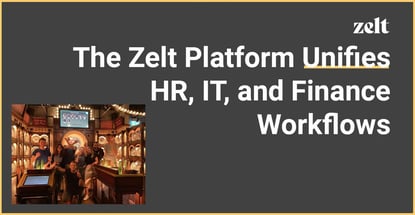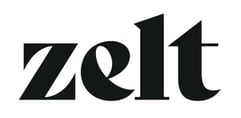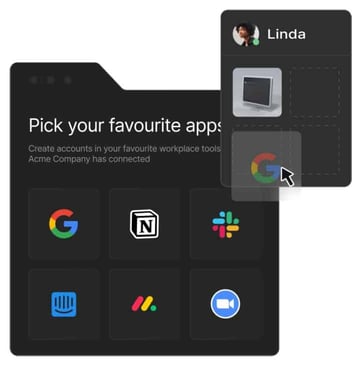
Our experts and industry insiders blog the latest news, studies and current events from inside the credit card industry. Our articles follow strict editorial guidelines.
In a Nutshell: As technology reduces geographical and workforce barriers for modern firms, managers and employees often find the disparate software they use to manage HR and other core functions holding them back. UK-based Zelt helps teams overcome inefficiencies associated with separate management platforms. Zelt combines HR, payroll, benefits, payments, and time-tracking functions with app and device management tools to automate workflows, enable self-service, and simplify day-to-day operations. With Zelt, companies spend less time and money managing what they have and more time planning for the next leap forward.
If you work for a modern company with a dispersed workforce and a work-from-home emphasis, you rely on software and networks to do your job and keep you connected internally and externally. Even the most tradition-bound firms have the same challenges and impetus to transfer HR, payroll, and many other managerial functions to platforms to take advantage of software’s ability to automate operations and empower individuals.
Indeed, it’s not an exaggeration to say the modern economy could not perform anywhere near as efficiently as it does if we were to turn off the internet. Everything would break, and we’d all be left in the lurch without a way to produce and earn.

But technology isn’t a panacea. Business and people management solutions don’t just suddenly materialize fully formed, ready to solve all your problems. Instead, market demand produces necessary platforms that may address one pain point while overlooking all the others.
Companies that are on the ball as early adopters with a growth strategy end up bolting multiple solutions together and hoping everything works. But things can get clogged (and expensive) when different systems from different vendors form your company’s plumbing.
That’s why market demand produced Zelt, a UK-based app and platform that ties HR, IT, and finance functions into a neat little bow for companies to maximize their potential. Head of Operations Daniel Ward said Zelt is a platform unifier and a source of greater operational and financial efficiency in a market that demands it.
“Why run 10 or 11 systems when you can run one?” Ward said. “Instead of paying to manage, interconnect, and have your employees log onto multiple platforms, Zelt lets you house your HR, payroll, and IT functions in one place.”
Manage People Operations Holistically
As with most great market solutions, the idea for Zelt arose after CEO Chris Priebe personally experienced these multiplatform pain points earlier in his career. Priebe happened to work in finance and investing, but he discerned that organizational commonalities across sectors meant a solution like Zelt could have broad application.
No matter the industry, all employees experience the same job life cycle, and all firms must onboard, manage, equip, compensate, and discharge workers. All firms must also seek solutions that encourage rather than impede efficiency as a prerequisite for growth.

“Standalone systems can be good systems — there’s nothing intrinsically wrong with them,” Ward said. “But using APIs to connect a core HR system to third-party tools, for example, leaves you not only paying for these different systems but relying on fragile APIs or manual data migration to keep them all in sync.”
Zelt’s modular core is its human resource information system (HRIS) that has employee and contractor data standing ready for deployment. There’s never a need to enter information more than once or find a process or tool to access it elsewhere.
Zelt’s secure, friendly, and customizable HRIS automates onboarding and offboarding, enables employee updates, streamlines approvals, and ensures compliance. The information system can also draw data insights that can feed into company goals.
A time off module manages holidays, sick days, work from home, parental leave, and unpaid holidays according to company policy, while a benefits module oversees healthcare and pensions. Zelt also provides a payments platform conforming to UK open banking standards for easy integration with financial providers and a payroll module to automate payroll and execute salary payments.
Plus, integration with common workplace platforms such as Slack and HubSpot enables workplaces to communicate with Zelt and each other in a manner they’re accustomed to.
“That allows teams to automate access management,” Ward said.
Modular Architecture Reduces Redundancies and Expenses
Zelt’s modular architecture means it’s not a one-size-fits-all solution. Ward said companies often onboard Zelt’s HRIS and then recognize the benefits of integrating additional modules as new needs and efficiency imperatives arise.
“Once they have the HRIS in place, they find they also need a system to manage payroll, and then they also likely need a system to manage benefits, and so on,” Ward said.
But that doesn’t mean Zelt isn’t available as a package. An added benefit is that pricing recognizes the financial challenges of small businesses. Zelt is free for companies of up to nine employees. After that, the platform offers its pro-level modules on a per-user-per-month basis.

Ward said it’s easy to connect (and potentially even disconnect) modules as needs rise and fall because Zelt works seamlessly, thanks to the HRIS’s ability to communicate across modules. That makes the system ideal for startups and small firms where organizational evolution is the rule rather than the exception, and tight budgets lead managers to seek solutions that can scale.
Many Zelt customers fall into that category, but the average client head count is growing from about 50-60 employees to 100, and the system can readily accommodate counts of up to 200-300 or more.
Because job responsibilities in many such small firms tend to overlap, Zelt includes robust app management functions to allow HR personnel, for example, to add and delete users and perform other platform-related duties.
Zelt also includes a device management module that allows employees to purchase, ship, and configure computers, phones, and other devices via MDM (mobile device management technology). That makes Zelt an all-in-one people management solution across the employee life cycle.
“Our international device store allows firms to rent devices and patches while we take care of all the logistics,” Ward said. “And our MDM allows you to encrypt passwords to keep devices secure.”
Provide a Delightful Employee Experience and Grow
In keeping with many of its clients, Zelt, founded in 2020, is still largely in startup mode. The team is small and remote-based, and the company’s customer base — dispersed across the UK, the EU, North America, and the Middle East — remains in close contact with its home base in London.
That means future-focused firms have an excellent opportunity to onboard with Zelt and play a significant role in the platform’s evolution. Ward said Zelt goes to great lengths to obtain and act on customer feedback.
“We stay quite close to all our customers,” Ward said.
Ward said a particularly fruitful opportunity to gather feedback comes at the early adoption stage when support requests come through. Just as Zelt arose to solve pain points for technologically focused companies, so does Zelt use support requests to inform product iteration.
Customers having a direct line to Zelt developers means Zelt can aggregate feedback to find the best solutions rather than build a series of fixes that may exacerbate challenges down the line. Feedback aggregation ensures Zelt grows to accommodate new customers of all sizes in new sectors.
“It’s super important that we ensure we’re building what our customers want, not just what they think they want,” Ward said.
Zelt maintains a knowledge center to help customers and the public understand how platform integration can support the efficiency goals of various firms, with tips and tricks for taking advantage of the product’s many features.
Sometimes, customers learn about Zelt’s sophistication after onboarding the product. That’s what happens when you put all the tools in your toolbox in one place where you can easily access and use them.
“The more you use the system, the more there are these wow factors of realizing the benefits on a day-to-day basis,” Ward said.


![9 Best Apple Pay Credit Cards ([updated_month_year]) 9 Best Apple Pay Credit Cards ([updated_month_year])](https://www.cardrates.com/images/uploads/2021/02/Best-Apple-Pay-Credit-Cards.jpg?width=158&height=120&fit=crop)

![7 Best Fintech Credit Cards ([updated_month_year]) 7 Best Fintech Credit Cards ([updated_month_year])](https://www.cardrates.com/images/uploads/2023/11/best-fintech-credit-cards.jpg?width=158&height=120&fit=crop)